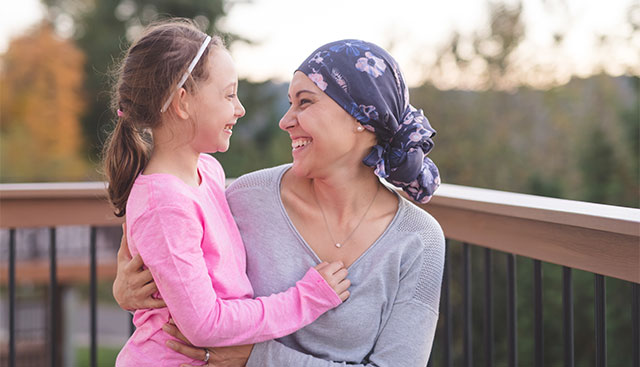
Experiencing Hair Loss During Cancer Treatment
Hair loss is a common side effect of some cancer treatments. our doctor can tell you if hair loss is likely to occur with the drug or drugs you are taking. For some people, losing their hair is difficult. Talk about your feelings with friends and family. Knowing what to expect and talking about it with others can help you cope with hair loss and other changes related to cancer treatment. You may want to join a support group.
When will alopecia occur?
The clinical term describing hair loss is alopecia. Hair loss usually occurs two to three weeks after the beginning of chemotherapy or radiation therapy. The rate at which people lose hair varies, as each person responds differently to treatment. Several days before hair loss occurs, your scalp may become very itchy and sensitive.
How much hair is lost?
Chemotherapy may affect all body hair. Since scalp hair is generally in an active growth phase, it is affected by chemotherapy more often than other body hair. Alopecia is usually temporary among patients receiving chemotherapy. The degree of hair loss is dependent on the drug and dosage used.
Radiation therapy affects hair in the area being irradiated. With radiation therapy, hair loss may or may not be permanent. The amount of hair loss can range from thinning to complete baldness. The quantity of hair loss as a result of radiation therapy is dose and site-dependent.
When is the right time to cut all of my hair off if I am expected to shed my hair due to treatment?
It is completely up to the individual patient. We recommend combing through the hair at least once a day to prevent madding and knotting. This is a service we do provide complimentary from the hospital. If you are an outpatient, please schedule an appointment with the salon. If you are impatient talk with your nurse to arrange the appointment.
Why does hair fall out?
Cancer cells divide and grow rapidly. Hair is also made up of fast-growing cells. Radiation therapy and chemotherapy are designed to destroy any cells that multiply quickly and cannot differentiate between cancer cells and hair cells. This causes the hair to fall out at the root.
 Who can help me with hair loss?
Who can help me with hair loss?
Before hair loss occurs, see a professional stylist at Magnolias Hair Salon who can assist you in selecting a wig that closely matches your hair style and color and who will show you other hair alternatives. Early consultation can ease your mind before you begin your treatment. Have a friend or family member present to offer support and a second opinion.
When does hair grow back?
On average you will start to see the hair growth back within two months of your last chemo dose. This time frame does depend on the dose of chemo you're given. Just because you are receiving chemo does not mean you will experience total hair loss. This is a conversation you should have with your doctors and nurses who know what your treatment plan looks like.
Radiation therapy may stop hair growth. Regrowth does not usually begin until several months after the radiation treatment is completed.
I am experiencing an itchy and/or sore scalp. Is this normal?
This can be a side effect from your chemo. This is a sign that your body is about to shed hair. Not everyone experiences this side effect and it will typically go away once the hair has shed. For those of you who are looking to elevate this feeling the salon sells an all-natural cream to take the side effect away. Always protect your uncovered scalp with sunscreen or products containing sunscreen when outdoors.
- Wear a nightcap for sleep if you find you are losing body heat with an unprotected scalp.
- You might find that sleeping on a satin pillowcase reduces friction.
How soon after cancer treatment can I have my hair colored?
As a general rule, one year. If you are looking to color your hair before this time frame, clear it with your doctor first. We also recommend a patch test be performed on your skin 24 hours before your appointment to insure no sensitivity or allergic reactions will occur.
We recommend using mild shampoos formulated to remove hormones and medications secreted on the scalp
Is there anything I can do to help my hair grow back faster?
The short answer is yes. A healthy diet, exercise, plenty of water and proper scalp care. On average your hair will grow a half-inch per month.
What hair alternatives are available?
There are several natural-looking hair replacements that will stay in place, are easy to care for, comfortable to wear, and reasonably priced.
- Wraps should be cotton, polyester or rayon, not silk.
- Hair prostheses (wigs) create a more natural look.
- Hair prostheses can be made from synthetic hair, human hair or a combination of the two.
- Any hair prosthesis should be fitted and shaped to suit each individual.
- Combinations of hats, head wraps or scarves are available in many styles.
Will the hair prosthesis be comfortable?
If fitted properly and securely, your wig will be comfortable. Some patients might experience more sensitivity of the skin. If you happen to have one of these side effects purchase a wig liner. This will provide a smoother surface.
What are some tips for securing a wig?
- Adjust tabs, pull in to tighten, let out to loosen
- Hairpiece double-sided tape placed in the base of wig cap at the forehead and on both ear tabs
- Using hairpins, place through nylon cap and wig on both sides and back of the head
- Roll on adhesive can be placed directly on the scalp and washed off with water
Will my insurance cover my hair prosthesis?
While every insurance plan is different and there is no guarantee of coverage in all cases, these guidelines may assist you in obtaining insurance reimbursement.
- Get a prescription from your doctor. The prescription should read "Cranial/Hair Prosthesis for medical purposes. Alopecia secondary to chemotherapy or radiation therapy."
- Obtain a receipt from your salon, specialty shop or hospital center for the fulfillment of the above prescription.
- Submit to insurance
- Educate your insurance company. Explain that the prosthesis is needed as a medical necessity and is not cosmetic.
- Have your doctor write a letter on your behalf.
- Keep a copy of all correspondence, document telephone conversations (with dates and person spoken to) in writing. Most policies do not spell out exclusions under prosthetics; check your policy carefully.
Do I need to make an appointment before coming to Magnolias Salon?
Yes, making an appointment for a compression garment, wig, breast prosthesis, or bra fitting is helpful to us so we can give you our full attention and reduce your wait time. By scheduling ahead, we can verify the necessary information, which will minimize your wait when you come in for your consultation. You can be confident that we will make every effort to accommodate your needs.
To schedule an appointment, please call 813-745-2490 or book online. For more information, visit Magnolias Salon.
